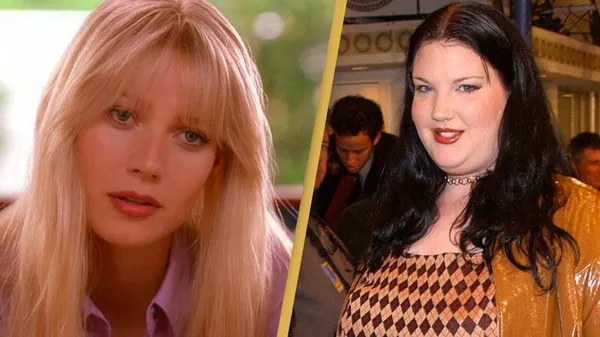The untold stories behind Hollywood’s glittering façade often cast a long shadow, and Ivy Snitzer’s journey after her involvement as Gwyneth Paltrow’s body double in the 2001 comedy Shallow Hal is a prime example. In a recent candid interview with The Guardian, Snitzer reveals the toll that the film’s success took on her mental and physical well-being, shedding light on the complex and often distressing realities that can arise from the spotlight’s glare.
Back in 2001, as an aspiring actress at the age of 20, Ivy Snitzer stepped into the role of Gwyneth Paltrow’s body double for the Farrelly Brothers’ memorable rom-com, Shallow Hal. The film, known for its unconventional portrayal of inner beauty, featured Paltrow as Rosemary, a plus-size woman who captures the heart of a man hypnotized to see beyond appearances. While Paltrow wore prosthetics and body suits to transform into the character, Snitzer’s role involved body shots and close-ups of specific body parts.
In her recent interview, Snitzer opens up about the unintended consequences of her role, revealing that despite feeling comfortable on set, she spiraled into a battle with eating disorders following the movie’s release. In her own words, she found herself “technically starving to death” just two years after the film’s premiere. The unexpected consequences of being part of a film that played on the sensitivities of body image issues and weight-related humor had a profound impact on her mental and physical health.
“The realization that the film would be seen by millions of people didn’t cross my mind,” Snitzer shares. “It felt like the negative aspects of being perceived as overweight were amplified.”
Shallow Hal, while offering moments of comedy, also exerted an influence on Snitzer’s perception of her own body. The film’s narrative, which humorously centers around Rosemary’s weight while Jack Black’s character falls in love, inadvertently instilled a sense of insecurity in Snitzer. “I started hating my body as I was supposed to,” she recollects. “I became obsessed with eating disorders, even finding a sense of pride in them.”
In 2003, Snitzer underwent gastric band surgery, a medical procedure designed to restrict food intake by reducing stomach size. However, the procedure brought along a series of complications, including a twisted stomach that made eating a constant challenge. Snitzer describes the aftermath in haunting terms: “I became so emaciated that my teeth were visible through my gaunt face, and my skin lost its natural color.”
While the physical consequences were undeniable, Snitzer also reflects on the more positive aspects of her involvement in Shallow Hal. Her passion for acting and comedy led her to pursue the role, and the filming experience was largely supportive. She praises the cast and crew for treating her with kindness and respect, emphasizing that they recognized her integral role in the film’s production. Even Jack Black, the film’s star, left a lasting impression as “a truly delightful person.” Gwyneth Paltrow, Snitzer recalls, was friendly and complimentary toward her acting abilities.
Yet, amidst the camaraderie, there were moments that highlighted the complexities of Hollywood’s standards. Snitzer recounts an incident in which a senior member of the production team, observing her weight loss, remarked, “This entire movie is based on you not losing weight!” These words serve as a sobering reminder of the industry’s intricate relationship with body image and expectations.
In the aftermath of Shallow Hal’s release, Snitzer found herself targeted by critics who accused her of promoting obesity. Harsh mail, including diet pills, arrived at her doorstep, amplifying her vulnerability and highlighting the dark side of public scrutiny. “I was genuinely frightened,” she admits. The ordeal left her contemplating an exit from the world of fame and acting, considering other paths.
Snitzer’s journey also unveils the limitations that the industry imposes on talent. Despite her aspirations for comedic roles, the offers she received pushed her in a different direction. She dismisses the “mean-spirited” offers that came her way, describing roles that depicted unflattering and derogatory stereotypes. The disparity between her dreams and the opportunities presented to her paints a poignant picture of Hollywood’s often harsh and narrow perspectives.
Shallow Hal’s portrayal of plus-size individuals faced significant criticism upon its release. Accusations of fat-phobia and perpetuation of stereotypes surrounded the film’s narrative. Sally E. Smith, editor of the now-defunct BBW Magazine, shared her perspective with EW in 2001, noting that while the movie’s moral message was positive, it fell short of addressing the broader issue. Smith asserted, “The moral of the story is lovely, but that’s not good enough.” She criticized the film for perpetuating harmful stereotypes and missing the mark on true inclusivity.
In conclusion, Ivy Snitzer’s experience as Gwyneth Paltrow’s body double for Shallow Hal shines a light on the intricate interplay between Hollywood’s glamour and the personal struggles that often remain hidden from view. Her story underscores the need for a more thoughtful and compassionate approach to storytelling, particularly when it comes to sensitive topics like body image. While the film industry has made strides toward greater inclusivity and representation, Snitzer’s journey reminds us that there is still much ground to cover in order to create a space that nurtures and uplifts all individuals, both on and off the screen.

